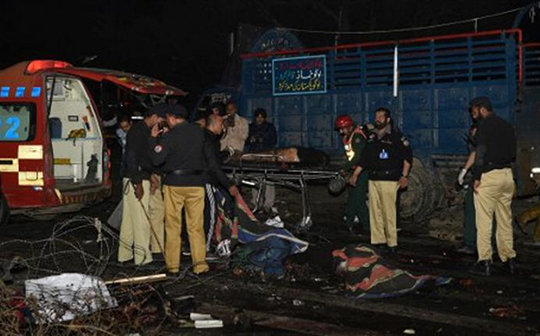New Delhi, Feb 13: At least ten people, including two top cops, were killed and several others injured in an explosion on Monday when a suicide bomber blew himself up during a protest rally outside the Punjab Assembly building in eastern Pakistan, police officials said.

Lahore Traffic Police chief capt (R) Mobeen Ahmed and Senior Superintendent Police Lahore Zahid Gondal were killed in the blast that targeted police personnel.
"Deputy Inspector General and Lahore police chief Mobeen Ahmed has been killed in the blast," Lahore police chief Amin Wains said.
He, however, did not confirm about other casualties. "I can confirm the death of Ahmed at the moment," Wains said.
DIG Ahmed had survived an attempt to his life during his posting in Balochistan.
A Lahore police officer said that apparently it was a suicide attack and the bomber targeted the police personnel present there. "The target was not the protest demonstration but the police officers," he added.
Punjab Law Minister Rana Sanullah confirmed that it was suicide blast and 'some police officers' have been killed.
The blast was so powerful that it was heard several kilometers from the place of occurrence.
"The chemists were protesting against the controversial drug regulations the government has recently imposed when a powerful blast took place. Several protesters were lying on the road before the rescuers shifted them," said Ishtiaq Ahmed, a representative of the Lahore Chemist Association.






Comments
Add new comment